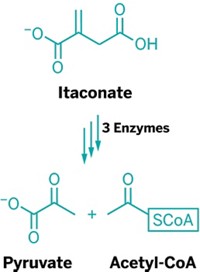Advertisement
Grab your lab coat. Let's get started
Welcome!
Welcome!
Create an account below to get 6 C&EN articles per month, receive newsletters and more - all free.
It seems this is your first time logging in online. Please enter the following information to continue.
As an ACS member you automatically get access to this site. All we need is few more details to create your reading experience.
Not you? Sign in with a different account.
Not you? Sign in with a different account.
ERROR 1
ERROR 1
ERROR 2
ERROR 2
ERROR 2
ERROR 2
ERROR 2
Password and Confirm password must match.
If you have an ACS member number, please enter it here so we can link this account to your membership. (optional)
ERROR 2
ACS values your privacy. By submitting your information, you are gaining access to C&EN and subscribing to our weekly newsletter. We use the information you provide to make your reading experience better, and we will never sell your data to third party members.
Biological Chemistry
Intelligence Is Not Required
February 13, 2012
| A version of this story appeared in
Volume 90, Issue 7
In his letter “Consequences of Misdirected Evolutionary Logic,” Keith Schofield claims that a geneticist’s not-atypical statement about evolution and reproductive mechanisms “is inconsistent with evolution and implies intelligence” (C&EN, Dec. 5, 2011, page 4). Although I find the statement in question to use a metaphorical “shorthand” not uncommon in evolutionary discussions (among geneticists or anyone else), there is real evolutionary logic behind it.
Evidently the statement that Schofield found objectionable in another C&EN article is, “It’s very dangerous for a species to rely on a single mechanism. If this were the case, then a single mutation could wipe out the next generation.” But this statement in no way requires “intelligence” in the evolutionary process.
For comparison, consider the statement, “Human brains grew bigger because it was dangerous for the species to have a smaller brain. If they did, a single predator could wipe out the next generation.” That might not be the most felicitous way of putting it (and it’s at best horrendously oversimplified). Surely Schofield would not claim that this statement implies that protohumans (let alone their DNA) somehow “knew” that a bigger brain would be a good thing. But the logic behind that statement and the one he objects to is exactly the same. In both cases, the evolutionary logic is that more individuals survived in subsequent generations from among ancestors who had the more adaptive trait (be it multiple reproductive mechanisms that could better survive “a single mutation” to one of them or bigger brains whose possessors were better able to escape “a single predator”) than from ancestors who didn’t.
Metaphors such as “dangerous” and “could wipe out the next generation” are perhaps unfortunately teleological. But they have long been ubiquitous in evolutionary discussion, probably because it’s just shorter to say things like that than to shoehorn “would have had more surviving offspring” into every sentence. Still, the underlying logic is the logic of natural selection, not “intelligence.”
By Jay Banks
South Orange, N.J.



Join the conversation
Contact the reporter
Submit a Letter to the Editor for publication
Engage with us on Twitter